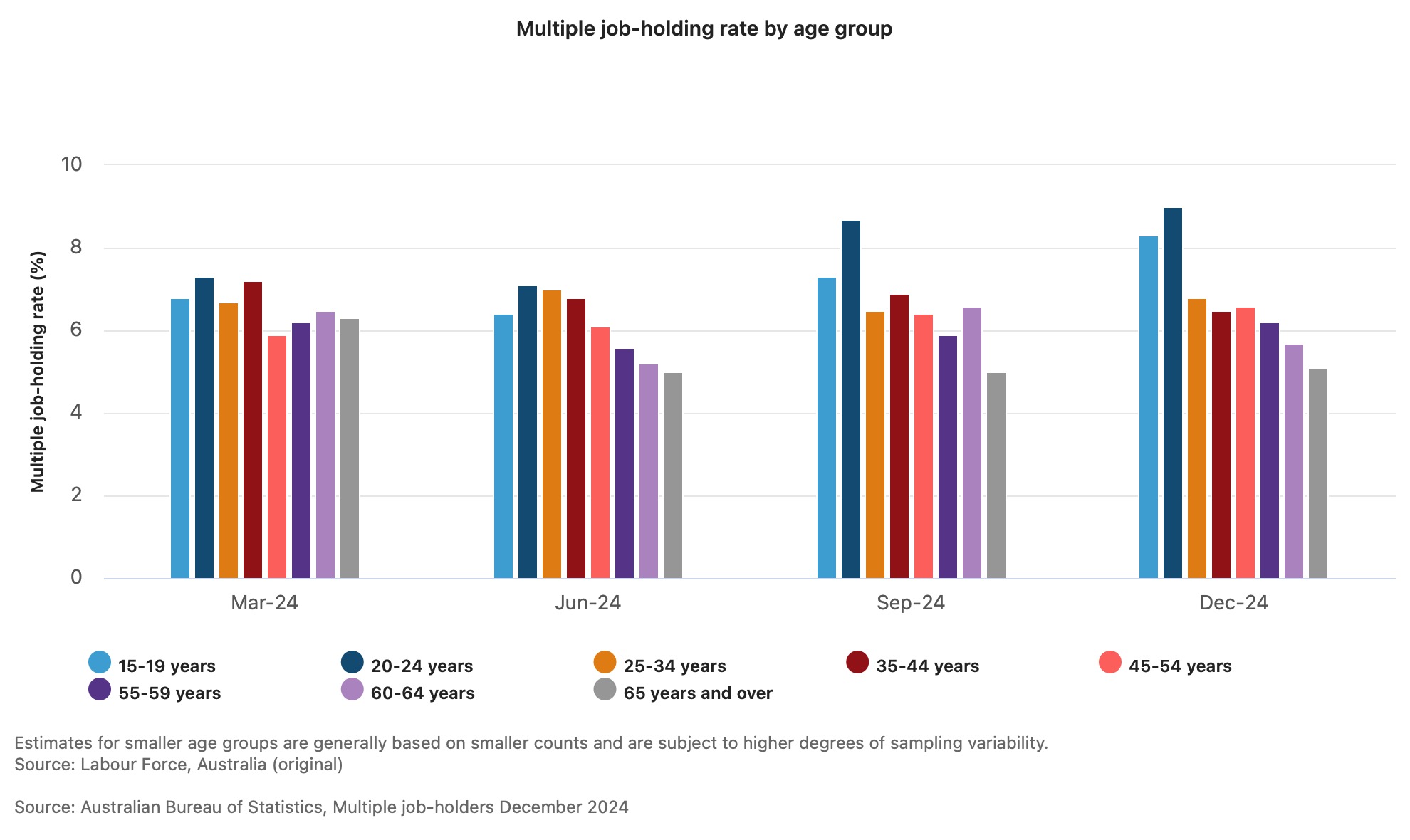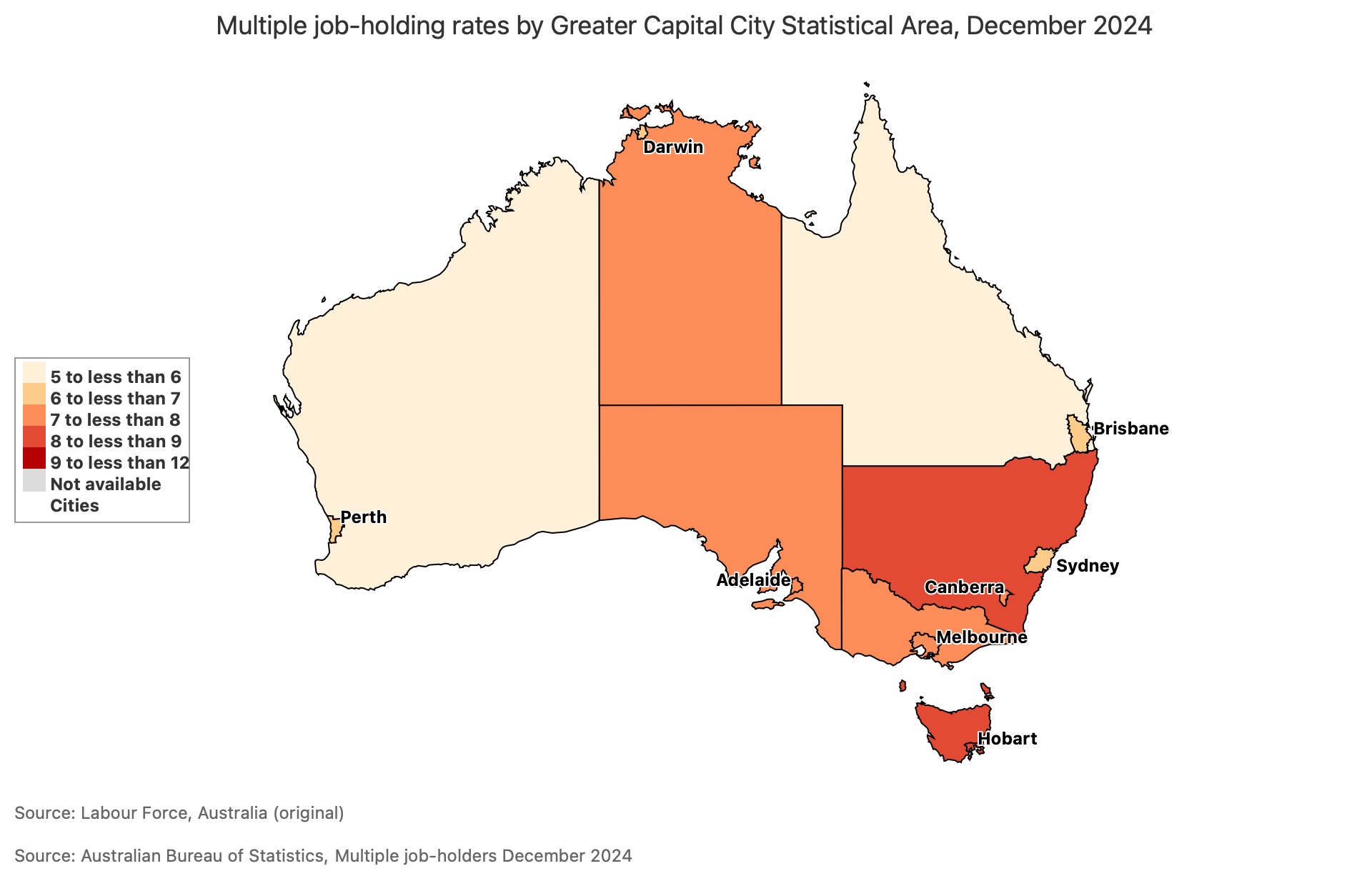
For many young people, having a full-time job was once a clear marker of stability. However, as living costs continue to soar and the nature of work undergoes rapid transformation, this traditional model is being challenged like never before. Increasingly, younger generations are turning to part-time jobs, freelancing, or the gig economy in search of a more flexible way to get by—one that meets their basic needs without sacrificing independence.
Does the pursuit of freedom drive this shift, or is it a forced choice under high prices and unstable employment conditions? Does the younger generation truly possess ‘the freedom of choice’?
Multiple Jobs: A Survival Strategy of ‘Passive Freedom’?

According to the Australian Bureau of Statistics (2024), approximately 1 million Australians were holding multiple jobs, representing 6.7% of the employed workforce. Young adults aged 20 to 24 were the age group most likely to be working multiple jobs. Additionally, those employed primarily as community and personal service workers had the highest incidence of multiple job-holding, at 9.9%. These figures highlight the growing prevalence of multi-job working arrangements across various demographics and occupations.

“I’m currently working two part-time jobs — one as a waitress in a Chinese restaurant and another as a freelance Mandarin tutor online. I work about 40 to 55 hours a week.”
A young person living in Sydney, Galaxy said, “Rent has gone up, and groceries are more expensive. I used to have one full-time job in retail, but it wasn’t enough to cover all my expenses.”
These voices reveal a harsh reality: for many, juggling multiple part-time jobs is not a choice, but a survival strategy to make ends meet. It’s less about freedom and more about “forced flexibility.”
Multiple Jobs: More Freedom or More Pressure?
Meanwhile, some young people are choosing to leave “stable” corporate jobs and become freelancers, especially in creative industries, social media, IT, and writing.
“I don’t want myself working in a single company from 9 to 5. Instead, I hope to freelance — maybe doing graphic design, social media consulting, and some writing. I want to have multiple streams of income and creative outlets.”
A soon-to-be graduate from the University of Sydney, Dalyza said, “I like being able to choose who I work with, what I work on, and when I work. A full-time job feels limiting — one role, one company. I prefer variety and ownership over my time.”
This perspective on freelancing reflects Gen Z’s strong emphasis on finding purpose and maintaining a sense of autonomy. Another reason for holding multiple jobs is the growing demand in society for individuals with diverse skill sets, alongside the significant economic pressures faced by young people. Recent data from the National Centre for Vocational Education Research (NCVER) reveals that an increasing number of young Australians are experiencing financial stress. The 2023 figures show that most 23-year-olds are employed, with 47% working full-time and 31% part-time. However, a quarter of these young workers are either seeking additional jobs or looking to change their current employment, and nearly one-third of part-time workers want more hours.
John King, NCVER’s Managing Director, emphasised that “rising financial pressures are affecting many young people’s ability to successfully transition into adulthood.”

Youth Mental Health: The Hidden Crisis Behind Flexible Work
Behind the seemingly “diverse choices” of modern employment, young Australians are facing a growing mental health crisis.

Recent research commissioned by Medibank highlights that Gen Z is the least confident generation in managing mental health, with two-thirds of Australians aged 18–30 reporting difficulty in discussing mental health struggles with older family members. Professor Patrick McGorry, executive director of Orygen, referred to youth mental health as “Australia’s national crisis”.
“It’s quite stressful sometimes. I don’t have much time for friends. But I feel proud that I’m managing to support myself.” Galaxy said.
Irregular working hours, limited social interaction, and lack of health security are gradually exhausting young people juggling multiple jobs.
The Hidden Risks Behind the Illusion of Multiple Jobs
Without institutional protections, this so-called “freedom” often comes with significant risks—behind the freedom lies a reality of no insurance, no pension, and no guaranteed minimum wage.
From juggling multiple jobs to starting their businesses, these employment trends reveal a deeper structural issue: Australia’s labor market and social security system remain primarily designed around traditional full-time employment, making it difficult to accommodate the rapid growth of non-standard work arrangements.
Multiple job holders often face double taxation without receiving proportional social benefits. Many freelancers lack automatic access to pensions, unemployment insurance, or paid sick leave. This situation exposes policy delays and regulatory gaps that leave non-traditional workers vulnerable and underserved.
Redefining Work: A New Generation’s Quest for Control and Meaning
Perhaps this generation of young people is not rejecting work itself, but rather refusing to accept an outdated, unfair system that can no longer support their survival.
What they want is not an easier life, but a way of working that offers more control and dignity—whether full-time, part-time, or freelance. They yearn for a system that is both flexible and secure, rather than being forced to choose between “freedom” and “stability.”
“I know I’ll have to plan well financially. But I think it’s worth it for the lifestyle I want. Also, “stability” in today’s job market feels more like an illusion — I’d rather bet on myself and diversify my skills.” Dalyza said.
“I think we’re rethinking what work means. It’s not just about climbing a ladder anymore — it’s about flexibility, purpose, and balance. Tech and social media have made freelance careers more possible than ever. We’re less afraid to take non-traditional paths.”
Building a Supportive Framework for the Future of Work
Young Australians are redefining what “work” means — it is no longer just a job, a contract, or a career ladder, but a lifestyle and a reflection of personal values.
However, achieving true “freedom” requires more than individual willpower. We need systemic responses:
Provide basic benefits (healthcare, retirement funds, minimum wage) for freelancers and gig workers
Simplify tax and social welfare access for multiple job holders
Expand public mental health resources
Align the education system with “non-linear” career paths
Update labor laws to give clearer protections to non-traditional employees
A society that values freedom doesn’t simply make everyone “responsible for themselves,” but ensures that everyone has a protected safety net when choosing freedom.
If we continue to ignore these young voices, “freelancing” will become a collective compromise rather than a collective liberation.
References
Australian Bureau of Statistics. (2025, March 7). Multiple job-holders, December 2024. https://www.abs.gov.au/statistics/labour/jobs/multiple-job-holders/latest-release
News.com.au. (2024, May 21). There’s a silent epidemic threatening the lives of Aussies. https://www.news.com.au/lifestyle/health/mental-health/theres-a-silent-epidemic-threatening-the-lives-of-aussies/news-story/196f3af2820a8fb06eafd25aae5efc90
National Centre for Vocational Education Research. (2023, November 30). More young people experiencing financial stress. https://www.ncver.edu.au/news-and-events/media-releases/more-young-people-experiencing-financial-stress

Be the first to comment